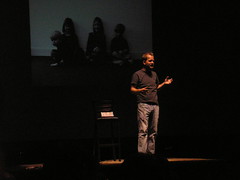
Chris Seay’s talk was on consumerism. I’ve heard his name spoken around here and there; I know my pastor is a big fan. I’m not sure about why he was chosen as the expert on consumerism… not against it but just not sure why. His talk was much more pastoral than the others; it was needed as it was a much more familiar style of talk.
Seay started out by talking about how commercials have been telling us a counterfeit story. This flowed really well out of Donald Miller’s talk. Seay stated that the counterfeit story we’ve been told is that “when we get what we want we will be happy” – and it is this lie that diverts our attention to consumerism.
Seay used the interesting analogy of how, when playing Sims, buying things make your Sim’s comfort level go up. We’re being trained that buying things simply for the sake of buying things is going to make us feel better. That we’re trained to want more.
Seay sees that in the history of scripture, Israel is always asking for more. There is always this human need to want more. Now, in America, the richest people in history are obsessing over what we don’t have.
In response to all this, Seay lets out the major point here: We were made to create, not just consume.
Some interesting stats he laid on us:
Americans spend:
$18 Billion on makeup
$15 Billion on perfume
$17 Billion on pet food
It would cost:
$5 Billion to eliminate illiteracy worldwide
$10 Billion to solve the water crisis for everyone in the world
$19 Billion to eliminate hunger worldwide
Seay also charged us to not spend so much on material gifts for Christmas, but instead use that money (Q attendees together spend an estimated $344,000 on gifts in 2006) to help change the world.
For me, this talk reminded me of one my ongoing threads of thought as of late: the role of the church in America is to be the pocketbook of the global church. Our money is worth such an average amount here to by above-average material items. Even a small portion of our money redirected to another country can literally save lives every day.
It’s hard because we have been so uneducated and inexperienced. Even at church we talk about all the new gadgets and gizmos and ways we can stay connected to build community… but don’t think to build community by changing lives across the world by giving $5 here and there. America doesn’t help us either, as – just as Seay said – the story has been made into a counterfeit consumerist one. We don’t get the news or see the images of our human brothers and sisters struggling while we try to decide what temperature to set the room we’re in.
Seay’s talk was a tough one because I feel like I should be moved to do something great and give away more than I already am. But we’re stuck in debt and can’t seem to do much until we get out of that. There are things I can sell and clear out my “space”… but are we called to have little? Or are we called to have wisely?
While I’ve been reading through the Old Testament I found that having things isn’t bad… it’s an honorable thing. I think the important thing is that we can “have” – but that we shouldn’t have in such excess that the people around us have so dramatically less. It’s ok to have a large house… but have people living with you. It’s ok to have toys… but make sure that the kids you know (and some you don’t know) have toys too.
Is that being too easy on myself? Should we live in poverty for the sake of poverty? It’s tough, strange line. Probably will be something we’ll all be dealing with as we live in America and spend on one meal the amount that could feed a child else where for a month. It’s probably something we’ll always be thinking and processing through.
And maybe that’s a good thing.
